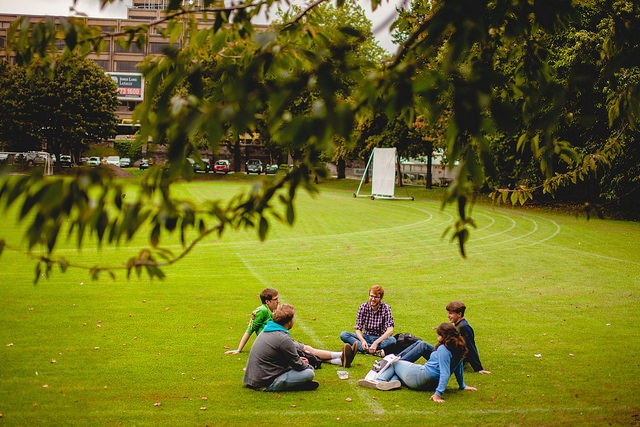From March 22nd to March 24th, students will have the opportunity to vote on a levy that would give Trinity students a student centre, as well as improved and enhanced spaces around College.
The student centre would include, at minimum, a large common room hub for students to go at any time of the day, event spaces, offices for accessible Trinity College Dublin Students’ Union (TCDSU) and Graduate Students’ Union (GSU) services, and break-out spaces, crucial for study and peer support.
This piece could act as a myth-buster in advance of the referendum, but I want to talk primarily about why it’s needed.
Coming to Trinity can be lonely. It can be isolating, and you can feel adrift. I’m as aware of that as anybody. If you’re not in lectures or the library, there are few spaces for students to go to. There aren’t nearly enough. The amount of students cramped onto the Arts Block floor at lunchtime is a testament to this.
This centre is for students – this referendum is to claim our own space. Only the union and societies will run events there
Besides that, societies and, indeed, the union are finding it increasingly harder to book rooms for events. This is not new, but the problem is certainly getting worse. For example, we had to cram the refreshers fair for new students into the Atrium in January. That’s just one example. Events have to be rescheduled regularly. There is a worrying trend towards commercialisation in College, some of which is necessary to keep the doors open, but it also has the unfortunate effect of encroaching on student and staff space.
I’ve been campaigning all year for student spaces. Progress has been slow. Room 4017 in the Arts Block has seen many battles to keep it as a space for students. New spaces are appearing, however. TCDSU has been paying for these out of a Higher Education Authority (HEA) fund given to us from a College misdemeanour in 2012, which can only last for six more years.
As a backdrop to all this, College has been working on an Estates Strategy, which will decide what buildings go on campus for the next 20 years. This is scheduled to be completed in June. Luckily, the student centre is proposed as part of that – but it is most definitely not the priority. If we have the levy, it will shoot it up the priority list and have a strong business case.
Six years ago, students were presented with a student centre proposal. It was to cost students €80 a year. It was voted down, and rightly so, as the plan included facilities we do not need (another bar on campus) or facilities that students should not have had to pay for such as offices for the Trinity Access Programme (TAP) and the Health Centre. In fact, the Health Centre is moving into Oisín House, the new 250-bed accommodation centre, in 2018.
This centre is for students – this referendum is to claim our own space. Only the union and societies will run events there. The first two years of the levy will prioritise improving current spaces and enhancing new ones. This will be particularly good news for off-campus spaces – the union will pay for the D’Olier Street foyer space and work with College on spaces in the TBSI, Tallaght, and more seating in St James’s Hospital.
I would also be doubtful about the opportunity to get this on the agenda for College in the next 10 years if we do not take this step now
The Central Societies Committee (CSC) also wants to improve society spaces. At present, there are more rooms for students promised in the Arts Block. We can pay for a kitchenette in the Hamilton Building end of campus with this. Postgraduate students can get the renovated kitchenette for the 1937 Reading Room which they have wanted for a long time. We can help the Counselling Service obtain new rooms.
The cost will be €30 per student for each year they spend in Trinity. In context, that’s one sports levy annual fee per student over four years. I was very keen that only students who will get use of the facilities should have to pay – this is why students currently in second, third and fourth year (including final year if you’re on a five-year course) won’t be charged. First-year students will see the benefit of the extra spaces as early as the middle of the next academic year. Students on hardship funding (roughly 10 per cent of the student body) will not have to pay, and TCDSU will help lobby for any student who finds difficulty in paying this. It’s also a finite charge – once it’s paid for, it’s done. It can’t be used for anything else.
This choice is for the student body and that is all that I ever wanted to bring. Looking back at the failed referendum in 2011, I believe that this proposal is the best deal that students could get. I would also be doubtful about the opportunity to get this on the agenda for College in the next 10 years if we do not take this step now. However, that is not for me, but for you, to say.
This is a project that would benefit us all, not just a few students. It’s time to claim our space in Trinity.
Kieran McNulty is President of Trinity College Dublin Students’ Union (TCDSU).







